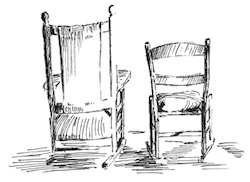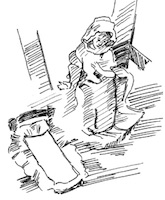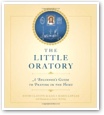The Church's Gift of Time
- DAVID CLAYTON & LEILA M. LAWLER
Have you ever thought about how we experience time?
So teach us to number our days that we may get a heart of wisdom. Psalm 90:12
 Time is something we take for granted yet is so mysterious. God's plan is revealed in time. Not only in the fullness of time, but in the gift of time itself. It is a gift, as it is a creation of God, and the dimension in which we go about receiving redemption.
Time is something we take for granted yet is so mysterious. God's plan is revealed in time. Not only in the fullness of time, but in the gift of time itself. It is a gift, as it is a creation of God, and the dimension in which we go about receiving redemption.
What could God mean for us, to number our days?
We know someone whose sect doesn't hold with the celebration of feasts. No festivity for Christmas. None for Easter. To a Catholic who greets every saint's day as if it's the last chance to eat a celebratory bowl of ice cream, this is unimaginable. It makes you start thinking through the different kinds of time that God gives us.
He could have given us, simply, a day, if He thought that a day is what we needed for our sanctification. But then He would have limited our perception of time to that span, wouldn't He have? In other words, we would always think about time as comprising a day. A week, a month, a season, a year — all would be unknown to us, simply because they would be superfluous to what was required for our nature.
Every day would be enough. We'd wake up every morning with a renewed spirit. We would experience the challenges of each twenty-four- hour period without reference to any other changes. In the evening, we'd ask for forgiveness for the ways we had strayed when we were awake, and then we'd retire. We'd speak of being so many thousands of days old! If we wanted to celebrate, we'd not have much time to prepare, really.

Of course, sometimes a day is enough — is all we can apprehend. "Sufficient unto the day is the evil thereof" (Matt. 6:34, DouayRheims). A good part of what we know to be true is contained in those words — that there is no use worrying about tomorrow or crying over yesterday. And, of course, there will come a day when a day is all we have left.
But that can't be the whole story.
If it were, there would be no need for the week, with its seven days, the uphill climb of work, and then the mercy of rest on Sunday. A week is quite mysterious, by the way, and surely points to the truth of the unique character of Sunday, for whatever would possess all peoples to bunch their days together this way? It seems so arbitrary. Why not three days or four? Surely that is more suited to the primitive (and by extension, presumptively infantile, unsophisticated) mind, which, as the psychologist Jean Piaget has shown, doesn't count beyond that low number. Or why not count the days by ten, to match the fingers? (Perhaps the Chinese went in this direction, but not for long.) Even given the lunar calendar — which even the Babylonians found only awkwardly lined up with a division of seven, yet they persisted — other numbers seem just as workable if we're breaking things up. And yet, seven it is.
There would be no need for the four seasons of the year, with their rhythm of growth, bounty, fading glory, and cold death. Without the seasons — without at least the idea of the seasons for those who don't have four — there would be no mirror of our spiritual life in the nature we see all around us.
And then there would not be the year, with its cycle that resolves into a spiral, going ever upward toward the light of man's span on earth. Recurrence yet forward motion.
Every year brings its reminder of what happened at this time last year. The reminder gladdens our hearts or renews mourning, as the case may be. We reflect more deeply on just what this birth of a long-awaited child meant to us, or just how we were, at the time, stunned by a departure. Above all, we contemplate the events of salvation in order, with Christ in the center, yet ever renewing.
And that reflection deepens our awareness and our gratitude and our sorrow and our resolve.
But this deepening isn't meant to occur only on the personal level. We see whole nations celebrating an event — say, victory over a foe — with the healing that remembrance brings.
The Church does this for us as well in her celebrations of the hours, the week, and the liturgical year. Our little oratory can help us follow her. In our home, we will keep alive the mystery that the Church is ever presenting to us.
Here, in this chapter, we'll limit ourselves to observing the liturgical seasons at the prayer table. The possibilities would expand beyond the scope of this book if we included the many customs the family can take part in to celebrate the liturgical year in the home; not to mention those your authors aren't familiar with! After our discussion here and in the next chapter, though, we'll try to speak of the most popular devotions that could be called extra-liturgical.But you will get the idea. The Church is our teacher — we are just giving you a basic template for your own creative response.
The day with its hours
The book of Genesis speaks of "evening and morning, the first day," which seems to point to night, really. Think of sleep. It's a bit like not being created yet. It's also a bit like death. How you look at sleep depends, perhaps, on whether you see it as what comes before you start your day or what comes when you are finished with it.
In any case, morning comes with its promise of a new day. Every hour goes by, and it's an hour that has been lived before by all of humanity (including our Lord) — that is to say, noon happens the same way every day. Yet, it's also a new hour that has never been seen.
A day is a unit of sanctification. In the next chapter, we'll explain specifically how the Church lives these hours, called the Liturgy of the Hours — her liturgical prayer. This treasury of the Liturgy of the Hours covers all the other sorts of time as well — how to live them, how to sanctify them. We just give you an overview here, and then you can dive in.
The Week — Sunday
In the secular world, the week is viewed as Monday, terrible, inexorable, challenging, anxiety-provoking; Wednesday, hump day; Thank God It's Friday; Saturday, the day for Taking Care of It All, although we may just sleep late due to TGIF; and Sunday, Another Day for Taking Care of It All (especially if we spent Saturday recovering).
But here is a Christian way of looking at the week. Monday through Saturday, we work with varying degrees of intensity, because God has given us the whole of creation to sanctify, giving matter its nobility. Pope John Paul II speaks of how "work is a good thing for man— a good thing for his humanity— because through work man not only transforms nature, adapting it to his own needs, but he also achieves fulfillment as a human being and indeed, in a sense, becomes 'more a human being' " (Laborem Exercens 9).
The Holy Father then warns about man los ing his dignity if work is used against him. That can take place in two ways, it seems. One is by outside force, when man works not out of freedom but in slavery; the other comes from within, through his own inability to rest.
Sunday is the remedy for this loss of dignity. Even the poorest person can rest on Sunday and can become a philosopher — that is, one who loves the wisdom and that which is good! He rises above his day-to-day needs and simply enjoys what is given to him out of the gratuitous love of the Creator.
The source of this enjoyment and even celebration is worship. Therefore, who would not put Sunday worship, the Mass, in the very first place in his life? If you put Sunday worship and Sunday rest first, all will be added unto you. You will finally understand life and your place in it. You will see your way clear to solutions to problems that have seemed intractable, or you will be content with the way things are, depending on what God's will for you is — which you will grasp.
When a person orients himself to Sunday and is determined to make it a different day (not another day of achieving things or getting things done), he finds that he is at peace.
As our faith grows, we see that we need more than an hour in church on Sunday. Not that we need to spend more time in the building, but that somehow the Sunday reality must permeate our daily life.
The prayer table is a way to bring the Sunday worship with its deep connection to the eternal into the home, extending it throughout the week, anchoring family life in the Eucharistic celebration. It's the physical connection between the altar in the church and the altar of the heart.
The Liturgical Seasons
Every year is the same, yet every year brings us closer to our home in heaven. The Church has divided the year into liturgical seasons, each with its own flavor, so to speak. The little oratory helps us live the liturgical year with the Church.

Many parents today search for meaningful ways to convey the richness of the Faith to their children, not realizing that the celebration of the liturgical year, plain and simple, with the Church, is the best way to teach them. And it requires little more than just living along with her. Sure, there are crafts and books and various activities, but the core of liturgical living, as practiced for two millennia now, is what we ought to be after.
In this way we start thinking with the mind of the Church, because her mind is in the seasons. You will find this out as you implement this "seasonal" way of thinking — you will notice a change in the readings and the prayers at Mass, and your prayer table will often reflect that change in a natural and almost effortless way. You will become detached from the frantic way of "celebrating" that the world pushes on us, which is focused on commerce, and attach yourself to the calm, truly joyful way of Mother Church.
Advent
The Church calendar begins with Advent, the time to prepare for the moment when heaven and earth reunite in the Incarnation. Your liturgical-year education begins here, because immediately you will notice how differently the Church enters this season from everyone else. If you can quiet your soul and turn away from the "holiday hype" of the world, you will begin to acquire the education in beauty and wonder that this season inaugurates.
The Church building is quite bare. The songs sung at Mass are full of longing; they are not the fulfilled, triumphant Christmas carols but the expectant chants of waiting. We are waiting for Christmas, that is to say, the birth of the Lord of Creation, and creation is waiting as well.
A crèche may be set up, but the Infant is not there yet. The trees may be placed before the sanctuary as the season progresses, but they are not decorated, and their plainness emphasizes the darkness. There is a penitential side to these preparations. It is the penance of expectation — the willingness to forego celebration until the moment, prepared from the beginning, arrives. One's mind turns to the poor and the help they need to stay warm and to celebrate as well. Extra good deeds are done to ready the heart to receive its Savior.
You note the Advent wreath with its four candles, lit week by week. You follow the readings as they lead from darkness into light.
At home, too, the prayer table can be made simple. Usually families put the wreath on the dining room table (or suspend it above the table from a chandelier with ribbons, as we do). Each Sunday another candle is lit, with the children taking turns. The candles can be lit every evening at dinner. A wonderful chant to sing while lighting is "O Come, O Come, Emmanuel," with its many verses. On December 17, one week before Christmas, it's traditional to sing a certain O Antiphon (verse) each day leading up to the vigil (the evening before the holy day). (See the resources for the Catholic Culture website.)
Perhaps a small nativity set can be placed on the home altar, with its Baby Jesus safely tucked away until Christmas (we put the figure in the top drawer of the dining room sideboard).
Near the nativity scene (either here or on the mantelpiece, for instance), you can place a small bowl or cup containing bits of straw. Your children can be encouraged to do little acts of service for family members and little acts of self-denial to prepare for the Lord's coming at Christmas. Explain to them that these deeds make Jesus' bed softer and that they can place a piece of straw in the manger (quietly and secretly, on their honor) for each such deed they perform. On Christmas Eve, after they have gone to bed, you can place the Infant Jesus on the bed of straws, made soft by the good deeds of your family.
Christmas
The liturgical season of Christmas begins at the Vigil Mass on Christmas Eve and continues until the feast of the Baptism of the Lord (January 9) at least, although some continue until the feast of the Presentation (February 2 — giving you more leeway on getting the tree down!). This is in stark contrast to the world, which abruptly cuts its "holiday" cacophony off on December 25, leaving folks somewhat bereft even of their ersatz celebration.
But Christians keep the feast for the octave (eight days) and beyond. At Mass, carols are sung, which is wonderful, since the repertoire is vast and certainly bears up to many days of exploration. If children are to know this treasury, it must be sung! Family visits and gatherings can continue all through the real Christmas season, with singing encouraged.
At the prayer table, the nativity has its Baby Jesus, and the Wise Men commence their journey toward the Holy Family. The Wise Men figures may be placed elsewhere in the room and, each day from Christmas to Epiphany, moved closer to the nativity scene. Children delight in moving them forward. The Holy Family icon can be brought out and a candle lit before it.
Epiphany
Epiphany, or Little Christmas, as Europeans call it, is a time of contemplating dedication to the star, which we can think of as the guide on the journey. Traditionally celebrated on January 6, this day is now moved to the second Sunday after Christmas. It can be thought of as a season that extends Christmas to feast of the Presentation. It is a time that people seem predisposed to make resolutions and recommit to their priorities.
At the prayer table, the Wise Men reach the crèche, bearing their gifts. Children can begin the challenge of thinking about vocation — the specific way they follow the call of Jesus. Gently, the prayers and readings in the Liturgy direct our minds toward the necessity of going down deep in our faith....
The Liturgical seasons expand our horizon of faith
Anyone who becomes frustrated by his limitations in the face of the vastness of the truths of the Faith should remember that salvation is a true story, a narrative that unfolded in history and continues to unfold in his life. The liturgical year doesn't just enhance our participation in the big moments of that narrative — it layers all the elements in a yearlong chronicle that we can take part in as the situation allows.
Some years, for instance, when a baby is on the way, or a new job is taking up all our available energy, the big moments are all we can handle. In other years, our own personal "Ordinary Time," when, for instance, we're in the thick of trying to educate our growing children, as a family we delve into every detail of that story.
When we think of time as a gift and a way to increase devotion to God, some traditions make more sense. Suddenly they don't seem mindlessly complicated. Each of us will have a very personal list of devotions we would like to keep alive in our consciousness, but if choosing seems overwhelming, we can relax in the thought that tradition has already provided a gentle way to cycle through different aspects of religion. Time has done this for us.
Time continues to unfold in its spiral way, and we can revisit all the necessary thoughts and spiritual aids in order. If we miss something this day or week or year, we will be given an opportunity in the next. Rather than worrying that we have forgotten something, or, worse, realizing that we, in our limited nature, have simply failed to consider part of our Faith, all the aspects are presented to us in this gift of time, which can be represented in the little oratory.
The more you find out about it, the more you appreciate how intimate and comprehensive it is!
Feast Days
"Ointment and perfumes rejoice the heart: and the good counsels of a friend are sweet to the soul" (Prov. 27:9).
Just as the seasons bring us into the "year of grace," so the celebration of the saints' lives is indispensable for our humanity. We need to commemorate those who have gone before — whose virtue and strength give us the example we need. Everyone needs a friend.

Without friends, we can't live — not as real human beings in relation to each other.
The saints are our friends par excellence. They go before us and encourage us. Their friendship is marked by this quality, the very epitome of the meaning of the word friend: they bring us closer to Jesus Christ.
Who wouldn't celebrate the feast day of a friend? Celebrating feast days satisfies a deep need of ours — to rejoice and be glad in companionship. The Church offers feasts and memorials of the saints in her liturgical calendar. It's up to the family and the community to decide which of these to commemorate and how. We're probably all familiar with celebrations of St. Anthony or St. Joseph in Italian sections of cities, but did you know that your family can do the same at home? Whichever saints' days and feasts appeal to you can be marked by a cake, a special supper, or a treat that you don't usually have.
At the prayer table, put an icon or prayer card of the saint for the day if you have one, perhaps with a little flower in a vase. If you are very lucky, maybe you have a relic of the saint to venerate! (Acts 19:11–12: "And God did extraordinary miracles by the hands of Paul, so that handkerchiefs or aprons were carried away from his body to the sick, and diseases left them and the evil spirits came out of them.")
This, then, is an overview of the sorts of time God has given us in His Church and in creation. Next we will look more in depth into hours with the marvelous prayer of the Liturgy, the Liturgy of the Hours.

Icons for coloring
by David Clayton

 This is Meaghen Gonzalez, Editor of CERC. I hope you appreciated this piece. We curate these articles especially for believers like you.
This is Meaghen Gonzalez, Editor of CERC. I hope you appreciated this piece. We curate these articles especially for believers like you.
Please show your appreciation by making a $3 donation. CERC is entirely reader supported.

Acknowledgement
 David Clayton & Leila M. Lawler. "The Church's Gift of Time." from Little Oratory: A Beginner's Guide to Praying in the Home (Manchester, NH: Sophia Institute Press, 2014): 49-60.
David Clayton & Leila M. Lawler. "The Church's Gift of Time." from Little Oratory: A Beginner's Guide to Praying in the Home (Manchester, NH: Sophia Institute Press, 2014): 49-60.
Reprinted with permission of Sophia Institute Press and the authors.
The Author
 David Clayton is Artist-in-Residence and Professor at Thomas More College of Liberal Arts, Merrimack, NH. He is the designer of the Way of Beauty program which is taught at TMC and focuses on the link between Catholic culture, in the broadest sense of word, and the liturgy. He wrote, co-produced and presented the 13-part TV series The Way of Beauty, shown by Catholic TV in 2010 and 2011. He writes for his weekly blog, The Way of Beauty, which also has an archive of longer articles, streaming of his TV work, and a gallery of his art. He is the sacred-art writer for the New Liturgical Movement website. David was received into the Church in London in 1993.
David Clayton is Artist-in-Residence and Professor at Thomas More College of Liberal Arts, Merrimack, NH. He is the designer of the Way of Beauty program which is taught at TMC and focuses on the link between Catholic culture, in the broadest sense of word, and the liturgy. He wrote, co-produced and presented the 13-part TV series The Way of Beauty, shown by Catholic TV in 2010 and 2011. He writes for his weekly blog, The Way of Beauty, which also has an archive of longer articles, streaming of his TV work, and a gallery of his art. He is the sacred-art writer for the New Liturgical Movement website. David was received into the Church in London in 1993.

 Leila M. Lawler is a wife of one, mother of seven, and grandmother of four (and counting), living in central Massachusetts. She is a convert to Catholicism from nothing-ism with a brief, completely uninformed and unconvincing stop as a Moslem (now called Muslim but not when she made that stop, which was sometime in middle school). Leila practices "kitchen-sink philosophy" at "Like Mother, Like Daughter", a website offering practical and theoretical insight into all aspects of daily life. She is the author of The Little Oratory: A Beginner's Guide to Praying in the Home.
Leila M. Lawler is a wife of one, mother of seven, and grandmother of four (and counting), living in central Massachusetts. She is a convert to Catholicism from nothing-ism with a brief, completely uninformed and unconvincing stop as a Moslem (now called Muslim but not when she made that stop, which was sometime in middle school). Leila practices "kitchen-sink philosophy" at "Like Mother, Like Daughter", a website offering practical and theoretical insight into all aspects of daily life. She is the author of The Little Oratory: A Beginner's Guide to Praying in the Home.




